What is an imperative sentence? A sentence that conveys a command, a warning, an instruction, a request, or an invitation is defined as an imperative sentence. An imperative sentence does not have a subject. It is a directive communicated to an inferred second person. The subject is implied in the sentence.
In an imperative sentence, the verb is always in the simple present tense. An imperative sentence ends with a period (.) or an exclamation point (!).
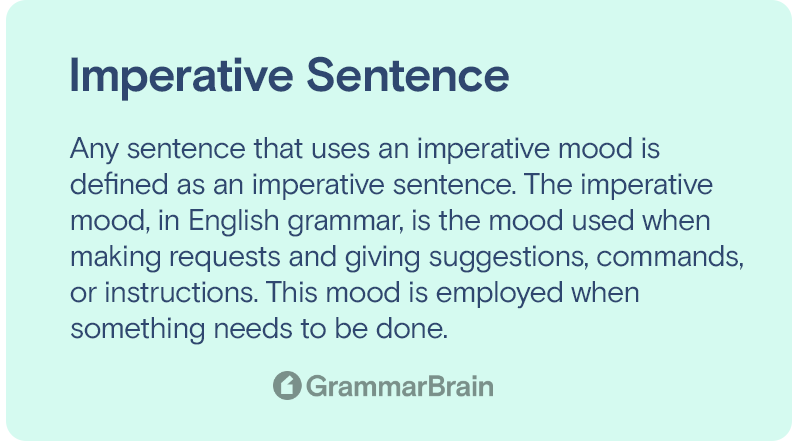
Imperative sentence: Definition
Any sentence that uses an imperative mood is defined as an imperative sentence. The imperative mood, in English grammar, is the mood used when making requests and giving suggestions, commands, or instructions. This mood is employed when something needs to be done.
Imperative sentences: Easy examples
Some commonly used imperative sentences include:
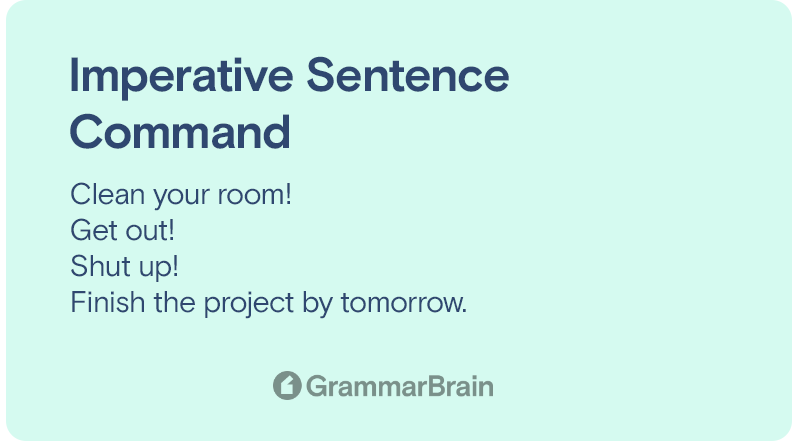
Giving an order or command
- Clean your room!
- Get out!
- Shut up!
- Finish the project by tomorrow.
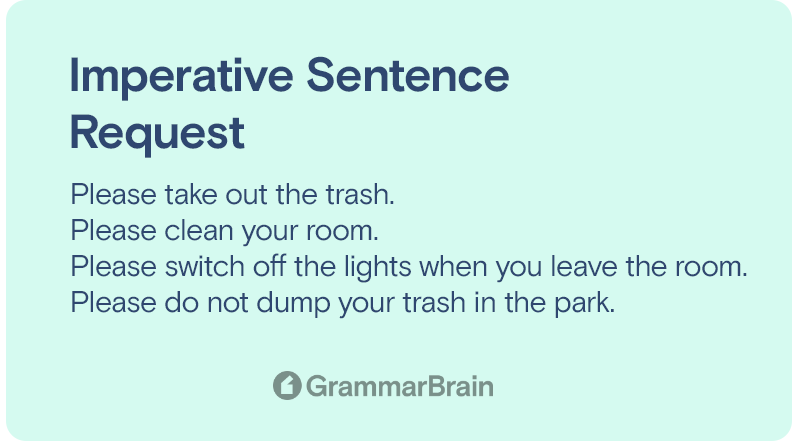
Making a request
- Please take out the trash.
- Please clean your room.
- Please switch off the lights when you leave the room.
- Please do not dump your trash in the park.
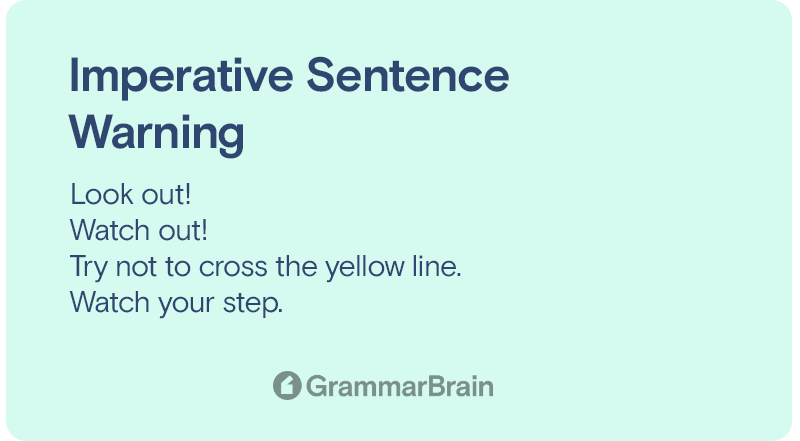
Giving a warning
- Look out!
- Watch out!
- Try not to cross the yellow line.
- Watch your step.
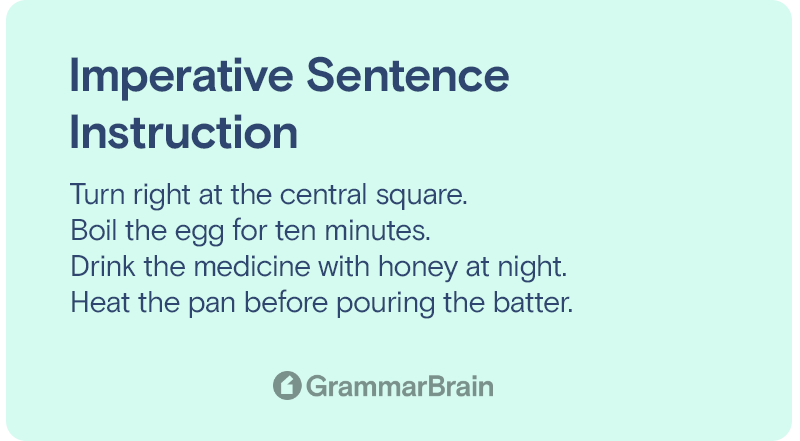
Giving an instruction
- Turn right at the central square.
- Boil the egg for ten minutes.
- Drink the medicine with honey at night.
- Heat the pan before pouring the batter.
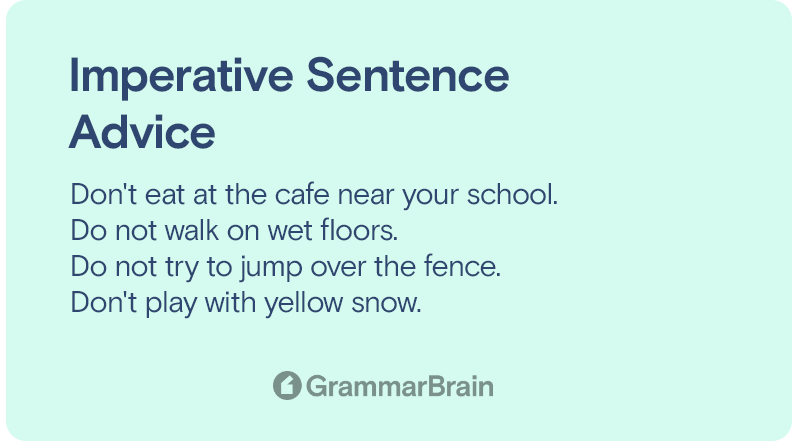
Giving advice
- Don’t eat at the cafe near your school.
- Do not walk on wet floors.
- Do not try to jump over the fence.
- Don’t play with yellow snow.
Rules for constructing an imperative sentence
The basic rules listed below will assist an author in better comprehending the idea of imperative sentences:
No subject
An imperative sentence does not have a subject. It starts with an imperative verb. The subject is understood but not mentioned.
Consider the sentences given below:
- Ronald, take the dogs out for a walk.
- Mary, start working on your midterm project.
- Kids, play carefully.
- Tutors, teach well.
- Children, stand in a line.
In the sentences above, the words in bold, namely “Ronald, Mary, Kids, Tutors, and Children,” are all proper subjects. Now consider the sentences that are formed when these subjects are removed.
- Take the dogs out for a walk.
- Start working on your midterm project.
- Play carefully.
- Teach well.
- Stand in a line.
Even after removing the subject, the sentences are still meaningful. This is due to the presence of imperative or bossy verbs, namely “take, start, play, teach, and stand.” These verbs allow the statements to still be understood as orders.
Choose the tone
The tone used in writing or reading an imperative sentence will determine whether it is a request or an order. The tone can be neutral, fairly neutral, or express intense emotions. Imperative sentences delivered in a neutral tone denote a gentle request. When spoken with a fairly neutral tone, it denotes a request. When spoken in a raised voice, it denotes an order or command.
Consider the examples given below:
- Please take out the trash. (neutral)
- Finish the project by tomorrow. (fairly neutral)
- Shut up! (expressing intense emotions)
Pick the punctuation carefully
Imperative sentences can use either exclamation points or full stops as punctuation. The choice of punctuation depends on the tone of the message it conveys. A sentence that makes a command, order, or intense emotional request is punctuated using an exclamation point. The sentences that make a request or suggestion typically end with full stops.
Examples:
Command or order
- Shut the window!
- Open your mouth!
- Stop shouting!
Request or suggestion
Imperative sentence structure
Imperative sentences are designed around imperative verbs. These sentences almost always begin with these verbs.
Consider the examples:
- Come here.
- Go to the opera at Madison Theater.
- Climb the tree from the other side.
In all these sentences, the verbs, namely “come,” “go,” and “climb,” are the first words of the sentence. But this may not always be the case. There are some exceptions to this rule. Examples include:
- Ensure that you comprehend the reason we are doing this assignment.
- Please don’t ruin the game.
- Please do not dump your trash in the park.
Imperative sentences: Different types with examples
Based on their construction or nature, imperative sentences are broadly classified into two types, namely positive or affirmative and negative imperative sentences.
Positive or affirmative imperative sentences
Affirmative or positive imperative sentences instruct the listener or reader to do something or take action.
Examples:
- Put the new pair of socks in the top drawer of the dresser.
- Clean the dishes before you leave for school.
- Come here!
Negative imperative sentences
Negative imperative sentences instruct the listener or reader to refrain from doing something.
Examples:
- Do not open the box before Christmas.
- Do not close the account before you are back in New York.
- Do not go to the mall if you have a fever.
Conditional imperative sentences
These are forms of imperative sentences that contain conditional clauses and are complex in nature. This sentence shows a cause or a condition and its (certain, probable, or even extremely unlikely) result.
- If your temperature goes up, eat paracetamol.
- When the teacher calls your name, go stand in the front.
- When you reach home, message me.
Direct – Indirect sentences
Since the subject is absent in imperative sentences and is only inferred, the direct sentences can be converted into indirect forms by using specific verbs. These include requested, advised, ordered, instructed, suggested, allowed, forbade, asked, and warned.
Examples:
Direct: The old man said, “Please give this letter to my son.”
Indirect: The old man requested me to give the letter to his son.
Direct: The mother told the children, “Do your homework.”
Indirect: The mother instructed the children to do their homework.
Direct: The commander yelled at the corporal, “Hold your fire.”
Indirect: The commander ordered the corporal to hold his fire.
Direct: The manager said to the workers,” Do not talk.”
Indirect: The manager forbade the workers to talk.
Direct: The tutor told her, ” Do not talk unnecessarily.”
Indirect: The tutor warned her not to talk unnecessarily.
How to make imperative sentences softer or less harsh
There are some imperative sentences that might come off as downright rude to the reader. An example is the sentence, “Do not tell me what to do.” Many authors find it difficult to write imperative sentences that do not sound rude or bossy. This is especially true in a written format where the mood of the sentence cannot be expressed using body language or voice.
There are some ways to make imperative sentences softer or less harsh. The method chosen for a sentence depends on some factors, like:
- the direction or instruction given by the author
- the connection between the author and the reader
- the inferred subject of the sentence
- the situation the author is referring to in the sentence.
Adding “please”
“Please” can be added in front of imperative sentences to make them seem polite. Consider the two sentences:
- Clean the dishes before you leave for school.
- Please clean the dishes before you leave for school.
In this example, the second sentence sounds softer and more polite than the first sentence.
Making a question
If an author is making a request, converting the sentence to a question can make them appear softer. Consider the two sentences:
- Please clean the dishes before you leave for school.
- Could you please clean the dishes before you leave for school?
Though here the sentence is no longer imperative, it conveys the same meaning to the reader, which is making a request.
Exercises in imperative sentences
Consider the following imperative sentences and identify the type of sentence and the imperative verb.
- Put the clothes in the washing machine when you come back.
- Do not disturb the injured cat.
- Throw the stale chicken out.
- If the bus is canceled, call for an Uber.
- Give the little girl a comb!
- Do not tell me what to do.
- Get out of my house!
- Drink the milk when it is warm.
- Unless you want Lily to be heartbroken, do not do this.
- Check the spiciness before you serve the food.
FAQs
How are imperative sentences different from exclamatory sentences?
Imperative sentences are often confused with exclamatory sentences since both can end in an exclamation point or mark. Imperative sentences that end in exclamation give an order or command. Whereas exclamatory sentences are used to express surprise, excitement, or similar heightened emotions. Examples of exclamatory sentences include:
- You are so cute!
- It is a girl!
- This game is making me insane!
- What a big cat!
- Oh, no!
- Hurrah! We won the match.
Exclamatory sentences contain a subject, whereas imperative sentences do not require a subject.
What is a common mistake that should be avoided when writing imperative sentences?
A common mistake many authors make while writing imperative sentences is using “myself”. The subject in imperative sentences is an inferred “you”. This implies that the verb can be combined with “yourselves” or “yourself”.
Example:
- Please share the chocolates among yourselves, kid.
- Take care of yourself, young man.
An imperative verb cannot be paired with emphatic or reflexive pronouns like “myself,” “ourselves,” “himself,” or “herself.”
Example:
Wrong: Please call your team leader or myself to report any issues.
Right: Please call your team leader or me to report any issues.
How to identify imperative sentences
Punctuation is the first clue to look for to identify if the sentence is imperative or not. The punctuation should be either a full stop or an exclamation point. Examine the verb after the punctuation. Imperative sentences frequently start with verbs that give a command. The lack of a proper subject is also an indication.
Sources:
- Merriam Webster – imperative(noun) – Definition
- Wikipedia – Imperative mood
- Grammarly – What Are Imperative Sentences?
- Thesaurus.com – What Is An Imperative Sentence? Understanding The Basics
Inside this article
Fact checked:
Content is rigorously reviewed by a team of qualified and experienced fact checkers. Fact checkers review articles for factual accuracy, relevance, and timeliness. Learn more.
Core lessons
Glossary
- Abstract Noun
- Accusative Case
- Anecdote
- Antonym
- Active Sentence
- Adverb
- Adjective
- Allegory
- Alliteration
- Adjective Clause
- Adjective Phrase
- Ampersand
- Anastrophe
- Adverbial Clause
- Appositive Phrase
- Clause
- Compound Adjective
- Complex Sentence
- Compound Words
- Compound Predicate
- Common Noun
- Comparative Adjective
- Comparative and Superlative
- Compound Noun
- Compound Subject
- Compound Sentence
- Copular Verb
- Collective Noun
- Colloquialism
- Conciseness
- Consonance
- Conditional
- Concrete Noun
- Conjunction
- Conjugation
- Conditional Sentence
- Comma Splice
- Correlative Conjunction
- Coordinating Conjunction
- Coordinate Adjective
- Cumulative Adjective
- Dative Case
- Determiner
- Declarative Sentence
- Declarative Statement
- Direct Object Pronoun
- Direct Object
- Diction
- Diphthong
- Dangling Modifier
- Demonstrative Pronoun
- Demonstrative Adjective
- Direct Characterization
- Definite Article
- Doublespeak
- False Dilemma Fallacy
- Future Perfect Progressive
- Future Simple
- Future Perfect Continuous
- Future Perfect
- First Conditional
- Irregular Adjective
- Irregular Verb
- Imperative Sentence
- Indefinite Article
- Intransitive Verb
- Introductory Phrase
- Indefinite Pronoun
- Indirect Characterization
- Interrogative Sentence
- Intensive Pronoun
- Inanimate Object
- Indefinite Tense
- Infinitive Phrase
- Interjection
- Intensifier
- Infinitive
- Indicative Mood
- Participle
- Parallelism
- Prepositional Phrase
- Past Simple Tense
- Past Continuous Tense
- Past Perfect Tense
- Past Progressive Tense
- Present Simple Tense
- Present Perfect Tense
- Personal Pronoun
- Personification
- Persuasive Writing
- Parallel Structure
- Phrasal Verb
- Predicate Adjective
- Predicate Nominative
- Phonetic Language
- Plural Noun
- Punctuation
- Punctuation Marks
- Preposition
- Preposition of Place
- Parts of Speech
- Possessive Adjective
- Possessive Determiner
- Possessive Case
- Possessive Noun
- Proper Adjective
- Proper Noun
- Present Participle
- Prefix
- Predicate



